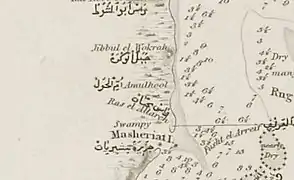Jebel Al Wakrah
Jebel Al Wakrah (Arabic: جبل الوكرة) is a hill and local landmark of the city of Al Wakrah on the eastern coast of Qatar. Located just off the shoreline, Jebel Al Wakrah is a level-topped rocky hill of brown color standing from 85 feet (26 m) to 104 feet (32 m) in height,[1] and is visible from approximately 12 miles.[2] It was formed almost entirely from wind-blown deposits.[1]

According to the Ministry of Municipality and Environment, the city of Al Wakrah derived its name from a hill that was a popular nesting spot for birds (bird's nest transliterates to "wakar" in Arabic), most likely referring to Jebel Al Wakrah.[3]
Archaeological artifacts were uncovered at the jebel by the Danish archaeological expedition during the 1950s and 1960s and by the British Mission led by Beatrice de Cardi in 1973.[1]
References
- de Cardi, Beatrice (1979). Qatar archaeological report: excavations 1973. Published for the Qatar National Museum by Oxford University Press. p. 13.
- The Persian Gulf pilot: comprising the Persian Gulf, Gulf of Omán; and Makran coast. Great Britain: Hydrographic Dept. 1890. p. 122.
- "Geoportal". The Centre for Geographic Information Systems of Qatar. Retrieved 20 February 2019.
